What is Powder Coating?
Powder coating is a versatile and advanced finishing process used to apply a protective and decorative layer to various materials, primarily metals. It involves the electrostatic application of a dry powder onto the surface of an object, followed by curing in an oven. This method results in a resilient and uniform coating that adheres tightly to the substrate, providing a durable and attractive finish
How does Powder Coating Differ from Traditional Painting, And why should you choose it?
Unlike traditional liquid paint, which is solvent-based and can be prone to dripping and sagging, powder coating utilises a dry powder applied electrostatically. This method eliminates the need for solvents, contributing to a more environmentally friendly process as it releases little to no volatile organic compounds (VOCs) into the atmosphere.
The powder-coated finish is also typically thicker and more even than liquid paint, and when choosing the right specification can offer enhanced durability and resistance to chipping, scratching, and fading.
The variety of available colours and finishes, along with the ability to coat complex shapes evenly, makes powder coating a preferred choice for premium steel rooflight manufacturers.
How Necessary is Powder Coating 316L Stainless Steel?
Powder coating 316L stainless steel holds significance beyond mere functionality, primarily enhancing its aesthetic appeal. While the stainless steel already resists rust and degradation, powder coating provides a polished, vibrant finish that elevates its overall exterior appearance.
The application of powder coating transforms the stainless steel surface, offering a sleek and attractive aesthetic that can complement various settings and applications. Although it doesn’t extend the lifespan of stainless steel, powder coating enriches its visual appeal, making it more appealing and desirable in diverse environments.
The addition of powder coating to 316L stainless steel rooflights, enhances their allure and ensures that they remain a timeless and eye-catching material choice.
How Durable is Powder Coating? 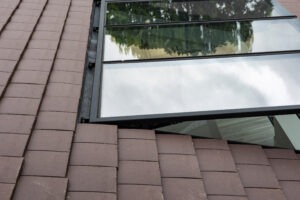
As previously mentioned, powder coating is renowned for its durability, offering a robust protective layer that withstands harsh conditions. The longevity of powder coating contributes to cost-effectiveness by reducing the frequency of maintenance and recoating, making it a reliable choice for long-lasting finishes.
How We Do It
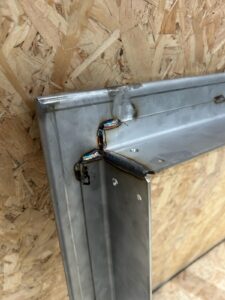
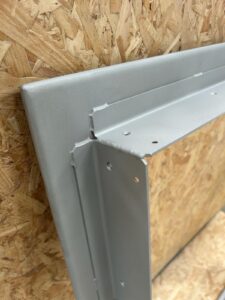
SA 2, denoting Thorough Blast Cleaning, is a meticulous process essential for achieving optimal results in surface preparation. This standard involves thorough cleaning and blasting of the surface, ensuring that any contaminants are effectively removed. The significance of SA 2 lies in its ability to create a uniform and pristine surface, promoting superior adhesion of the powder coating. This level of precision sets the foundation for Stella’s successful powder coating application, contributing to the overall durability and attractiveness of the finished product.
Glass Is Better: When preparing 316L stainless steel for powder coating, it’s essential to avoid using shot blasting due to the potential reactivity between the chromium in the stainless steel and the steel shot, leading to undesirable cross-contamination. To ensure a pristine surface and optimal powder coat adhesion here at Stella we opt for fine grade glass blasting.
Glass provides a non-reactive and smooth abrasive medium, effectively eliminating the risk of cross-contamination. This method ensures a clean and uniform surface on the stainless steel, creating an ideal foundation for the subsequent powder coating application. By choosing glass over shot blasting, we can achieve both a high-quality finish and maintain the corrosion-resistant properties of 316L stainless steel.
The Role of Blasting in Removing Contaminants and Creating an Ideal Surface: Beyond mere cleanliness, the blasting process imparts a textured surface that enhances the adhesion of the powder coating. This texturing, often referred to as surface profiling, ensures a strong bond between the substrate and the powder, contributing to the longevity and durability of the final finish.
The Stella Powder Coating Process
To achieve impeccable results, Stella Rooflight follows a systematic approach to masking, application, curing, and inspection. Each crucial stage is meticulously executed to ensure a flawless finish every time.
Masking and Prepping. 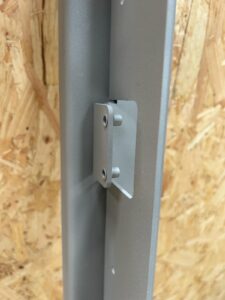
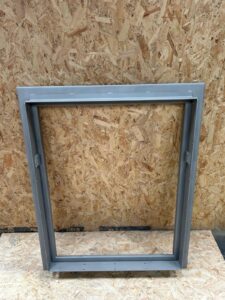
Identifying areas that need protection during coating: Before commencing the powder coating process, our team identifies and protects areas that should remain untouched. Properly masking off areas, such as hinge section threads, ensures that only the intended surfaces receive the coating, preventing overspray and preserving the integrity of the substrate.
Selecting the Powder Coating.
Choosing the correct powder coating is pivotal for the success of any powder coating project. At Stella Rooflight, we exclusively choose marine-grade powder coat, available in any RAL colour of your preference.
Opting for a marine-grade powder coat ensures a high-quality finish and reinforces the corrosion resistance of our products. While our rooflights are inherently corrosion-resistant and might not require powder coating, we remain committed to applying the best possible powder coat to enhance the outward appearance. This decision contributes to maintaining the rooflight’s fresh and smart look for an extended period, emphasising our dedication to both aesthetics and durability.
The electrostatic application process: Applying the powder for powder coating involves a crucial step known as electrostatic application, which plays a pivotal role in achieving a consistently even and adhesive coating. In the electrostatic application process, positively charged powder particles are sprayed onto a negatively charged object, creating an electrostatic attraction that ensures a uniform distribution of the powder across the surface. It is imperative to have a deep understanding of these electrostatic principles to optimise the coating’s adhesion and coverage.
Ensuring even coverage and avoiding common mistakes:
Attaining a uniform and professional finish through powder coating relies on the meticulous consideration of various factors. Stella Rooflight places significant importance on not only achieving even coverage but also avoiding common pitfalls that can compromise the quality of the coating.
To ensure a flawless outcome, it’s crucial to pay close attention to powder flow rates, gun-to-part distance, and application angles. These aspects play a pivotal role in preventing issues like orange peel texture or uneven coverage, which can detract from the overall aesthetic and durability of the coated surface.
To elaborate further, maintaining an optimal powder flow rate ensures that an adequate amount of powder is dispensed, preventing over-application or insufficient coverage. Controlling the gun-to-part distance helps regulate the concentration of powder being sprayed onto the surface, contributing to a consistent and well-distributed coating.
Additionally, being mindful of application angles is key to avoiding shadows and ensuring that all areas of the object receive uniform coverage. Stella Rooflight underscores the importance of incorporating these considerations into the application process to achieve not only a visually appealing finish but also a coating that stands up to the test of time.
By addressing these factors and steering clear of common mistakes, Stella Rooflight aims to deliver powder-coated surfaces that not only meet professional standards but also exceed expectations in terms of longevity and aesthetic appeal.
The importance of curing in the powder coating process: Curing is a critical step that ensures the durability and longevity of the powder coating. The curing process chemically bonds the powder particles, creating a robust and resilient surface.
Oven settings and temperature control: Proper curing requires precise control of oven settings, including temperature and duration. Stella Rooflight adheres to manufacturer recommendations and regularly calibrates equipment to contribute to optimal curing results.
Monitoring the curing time for optimal results: Consistently monitoring the curing time is essential to prevent under-curing or over-curing. Striking the right balance ensures that the powder coating fully cures, providing the desired performance characteristics.
Final Inspection and Quality Control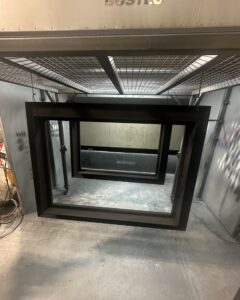
Identifying and addressing potential defects: A detailed inspection is conducted to identify any defects, such as bubbles, pinholes, or colour inconsistencies. Stella Rooflight promptly addresses these issues to enhance the overall quality of the finished product.
Final quality checks before considering the job complete: Before declaring the powder coat complete and ready for assembly to start, Stella Rooflight conducts comprehensive quality checks to ensure that all aspects of the powder coating process meet the desired standards. Attention to detail during the final inspection phase ensures a professional and durable finish, reflecting the commitment to excellence at every stage of the process.

